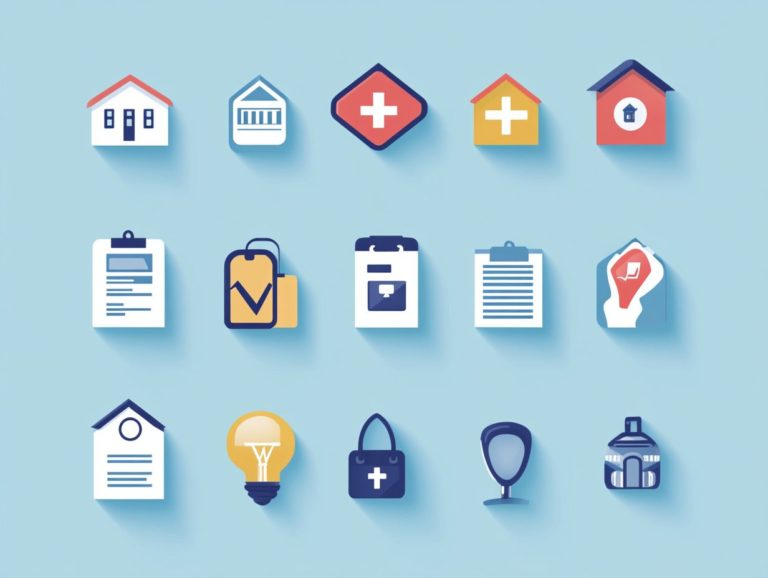What is the Importance of Insurance?
Insurance serves as a vital shield for your finances, offering peace of mind in an unpredictable world.
Whether you re considering health, auto, home, or life insurance, grasping the nuances of each type and their significance empowers you to make informed decisions. This article distills the essentials of insurance, explores common varieties, and underscores the importance of having coverage for your protection and security.
You ll find practical advice on selecting the right policy and maximizing your benefits. Dive in to navigate the insurance landscape with confidence and clarity!
Contents
Key Takeaways You Can’t Miss!

- Insurance provides protection and financial security for individuals and businesses in case of unexpected events.
- Having insurance can bring peace of mind by alleviating financial burden and providing a safety net for unforeseen circumstances.
- It is important to assess needs and budget, research and compare plans, and regularly review and update policies to make the most out of insurance coverage.
Understanding Insurance
Understanding insurance is crucial for you as a U.S. resident and policyholder. It involves a wide range of health coverage options tailored to shield you from the financial burdens of medical expenses and chronic conditions.
With numerous insurance policies available, including those under the Affordable Care Act and Medicaid programs, you must skillfully navigate the insurance landscape to identify plans that provide adequate financial protection and access to essential health resources.
Definition and Basic Concepts
Health insurance is the agreement you enter into with insurance companies that offers you financial protection against medical expenses and healthcare costs.
This essential safeguard includes a range of coverage programs designed to help you manage the financial burden of medical treatments. When you purchase a policy, you typically agree to pay premiums regular payments that keep your insurance coverage active.
In return, you can expect support with your medical bills, but only after you fulfill certain out-of-pocket costs, such as deductibles (the amount you pay before your insurance starts helping) and co-pays (fixed fees for services like doctor visits or prescriptions).
By grasping these fundamental yet critical concepts, you give yourself the power to make informed decisions about your health insurance options.
Types of Insurance
The landscape of health insurance presents a variety of options, primarily encompassing Medicaid, Medicare, and private insurance plans. Each of these is crafted to address the diverse needs of U.S. residents.
In particular regions like Texas and Massachusetts, where Medicaid expansion is pivotal, these options significantly enhance access to care. They ensure that individuals can find the coverage that best suits their circumstances.
Overview of Common Insurance Types
Common insurance types include Medicaid and Medicare, both of which play pivotal roles in providing coverage to diverse demographic groups within the U.S. health care landscape.
Medicaid is primarily designed for low-income individuals and families. It offers a comprehensive suite of services, including hospital visits, preventive care, and long-term support. This makes it an essential lifeline for those who might otherwise struggle to afford medical expenses.
Medicare focuses on seniors aged 65 and older, as well as certain younger individuals with disabilities. It offers crucial health services such as inpatient care, outpatient services, and prescription drug coverage, all tailored to enhance accessibility to necessary health care.
Knowing the eligibility and benefits of each insurance type is crucial for your health and peace of mind. This knowledge gives you the power to make informed decisions about your health coverage options, ensuring that you choose the best path for your well-being.
The Importance of Insurance

The significance of health insurance cannot be overstated. It serves not only as a crucial safeguard against unforeseen medical expenses but also dramatically enhances your access to care. This, in turn, leads to better health outcomes and contributes to the overall well-being of the community.
Protection and Financial Security
One of the primary roles of health insurance is to provide you with financial protection. It ensures that you are shielded from the unexpected burden of medical expenses. These costs can often create significant barriers to accessing essential treatments.
Without adequate coverage, even routine procedures can become a source of anxiety. The price tags can soar to heights that force you into making tough choices about your health. This financial environment can leave many hesitant to seek timely care, fearing the repercussions of accumulating medical debt.
Thus, health insurance is vital for fostering peace of mind. It allows you to pursue necessary medical interventions without the shadow of overwhelming costs.
When you have reliable insurance, your focus can shift to recovery and well-being, rather than wrestling with the stress of high medical bills.
Peace of Mind
Having health insurance offers you peace of mind. It allows you to access necessary care without the weight of financial worries, especially regarding mental health and preventive services.
This sense of security encourages you to seek timely medical attention and engage in proactive health management, both of which are crucial for maintaining your overall wellness.
With the support of a comprehensive insurance plan, you feel empowered to attend regular check-ups, access counseling, and utilize essential therapies.
Knowing there s financial backing for unforeseen health challenges can significantly ease your anxiety. It fosters a more stable state of mental health. In this way, health insurance becomes a vital tool, not just for your physical well-being, but also for helping you stay mentally strong and promoting a balanced lifestyle.
Factors to Consider When Choosing Insurance
When choosing a health insurance plan, you must evaluate your needs and budget. These aspects play a pivotal role in determining the range of coverage options available to you and directly affect your access to quality healthcare.
Assessing Needs and Budget
Evaluating your health needs and financial budget is essential before purchasing health insurance. This helps you determine the most suitable plans based on insurance premiums and coverage requirements.
By analyzing your personal medical history, anticipated healthcare usage, and specific needs, you can make informed decisions that align with your lifestyle and future health expectations.
Understanding the details of insurance premiums is crucial. Knowing how these costs fit into your overall financial picture ensures that essential coverage is not only affordable but also adequately meets your expected health service requirements.
This assessment helps you choose a plan that balances both your health necessities and financial security. It allows you to enjoy peace of mind in an unpredictable medical landscape.
Researching and Comparing Plans

Researching and comparing different health insurance plans is essential in today s insurance landscape. It empowers you to make informed decisions about your healthcare costs and coverage options.
Understanding the nuances of each plan is crucial. It enables you to weigh important factors such as monthly premiums, deductibles, and out-of-pocket expenses.
Begin by identifying your specific healthcare needs to effectively narrow down your options. By evaluating elements like network coverage, prescription drug benefits, and customer service ratings, you can gain clarity on which plans deliver the best value.
Utilizing online comparison tools and consulting with licensed insurance agents can offer deeper insights. This ensures that your final choice aligns seamlessly with your financial and health objectives.
How to Get the Most Out of Your Insurance
To truly maximize the benefits of your health insurance, you need to fully understand your policy coverage. Navigating the claims process with finesse will serve you well, as will effectively utilizing the health care resources at your disposal.
By doing so, you can ensure that you are making the most of your health care options and achieving optimal utilization for your well-being.
Understanding Coverage and Claims
Understanding the nuances of your health insurance coverage and the claims process is essential for maximizing the benefits of your policy and avoiding unexpected out-of-pocket expenses.
Many consumers overlook critical elements such as deductibles and co-pays. A deductible is the amount you need to pay out-of-pocket before your health insurance starts covering medical costs. Co-pays are the fixed fees you pay for specific services or medications.
The claims process can be confusing, but familiarizing yourself with it can improve your interactions with insurance providers. Knowing how to submit a claim and what documentation is necessary can reduce confusion and ensure prompt reimbursement. This ultimately empowers you to make informed decisions about your healthcare, including options under the Affordable Care Act.
Tips for Managing and Updating Policies
Proactively managing and updating your health insurance policies is crucial for maintaining adequate coverage and staying informed about available health resources, such as Medicaid expansion programs.
Regularly assessing your insurance plan, including individual market options, helps you identify gaps in coverage or benefits that may not align with your current health needs. This periodic review is your opportunity to consider significant life changes like family growth, new medications, or shifts in employment that might require adjustments to your premiums or deductibles.
Using online tools and resources can help you compare different policies and clarify benefits, especially regarding preventive health services. Staying connected with your insurance representatives ensures you receive timely updates, allowing your chosen plan to effectively serve your best interests.
Frequently Asked Questions
What is the Importance of Insurance?

Insurance protects you and your assets from potential financial risks and losses, ensuring financial stability against unexpected medical expenses.
Why is having insurance important?
Having insurance gives you peace of mind, knowing you are financially protected in case of unexpected events, such as emergency visits or chronic conditions.
What are the different types of insurance?
There are various types of insurance, including life insurance, health insurance, property insurance, and auto insurance, all crucial for effective risk management.
How does insurance benefit individuals?
Insurance provides individuals with financial stability and security by covering the costs of potential losses and damages, alleviating the financial burden associated with medical expenses.
What is the role of insurance in society?
Insurance promotes risk management, encourages savings, and provides financial stability to individuals and businesses, contributing to community well-being.
What are some examples of situations where insurance is important?
Insurance is essential in situations such as accidents, illnesses, natural disasters, and unexpected events that can result in financial loss or damage.
Understanding and managing your insurance policy is key to protecting yourself and making the most of your coverage. Review your policy now to unlock better options!






